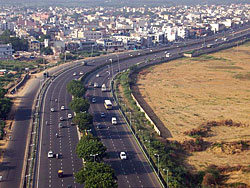 |
The cars are being held back by unscrupulous drivers criss-crossing lanes, many using cash in the RFID pass lanes. As a result, it takes more than 20 minutes to drive through the toll plaza. So much for the time I saved on the expressway.
The point is, the benefits of the best roads and technology count for nothing if you can't change people's attitudes. So, lesson No.1: hardware and technology upgrades have to be backed by changes in mindset, which are always the hardest to achieve.
The skyscrapers may have given Gurgaon a look that puts some of the west coast developments in the US to shame, but the streets are dotted with shacks, cattle and garbage. Every cop wants to pull you over to make a quick buck. To be sure, cops, car mechanics and politicians may be the same all over the world, but how can a city claim to drive the Indian economy when its residents remain the same as their brethren in Jogbani or Raxaul?
If the government makes lots of money collecting taxes from multinationals and other companies operating in the cities, it has a duty to provide better citizen services too. Lesson No. 2, the government must invest the taxes it collects in a particular area or service back in the same area or service. For instance, at our own airport, while airport tax collected from a mere 25 passengers could pay for a luggage trolley, we still rely on other organisations to give them to us.
Gurgaon's world-class housing and golf courses arrived in advance of public infrastructure, fancy bathroom fittings preceded a reliable water supply and expensive, sensor-aided, hygienic WCs were given priority over sewer lines. In the absence of public transportation, the choice is between driving a BMW to the mall, and a subsequent 20-minute wait for a parking slot, or riding a man-pulled rickshaw. Lesson No. 3 for Nepal, we should build efficient service infrastructure before satellite cities.
Perhaps there should be a system of collecting high infrastructure development fees from builders to be put into a fund managed according to public-private partnership models. This could ensure basic service delivery.
During every visit to India's National Capital Region, this Beed is struck by the realisation that distance kills. While it takes minutes to confirm a meeting on one's Blackberry and respond to emails, it takes hours to get to the meeting that has been so easily set up. The Beed keeps wondering how this hurts productivity. When most services are outsourced, it becomes more important that the outsourced service is delivered on time. When computer networks go down or when physical delivery of items is impeded by traffic, what is the effect on productivity?
A well-managed city, therefore, has enormous advantages. Would it be better to have a city where distances are manageable or one where distances are managed well? Lesson No. 4, does Nepal have the opportunity to leverage this and use it to attract businesses?
READ ALSO:
Living between nervous giants - FROM ISSUE #475 (06 NOV 2009 - 12 NOV 2009)
Nepal's Mr Nepal - FROM ISSUE #465 (21 AUG 2009 - 27 AUG 2009)
Nepal and India - FROM ISSUE #465 (21 AUG 2009 - 27 AUG 2009)



